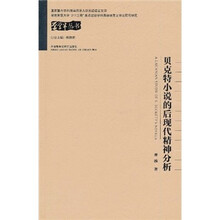Introduction
Chapter 1 Beckett's Novels and Lacanianism
1.1 Contemporary Criticisms of Beckett's Novels
1.2 Psychoanalysis and Beckett's Novels
1.3 Postmodernism and Beckett's Novels
1.4 The Feasibility of a Lacanian Study
Chapter 2 Murphy: Dilemmas of Narcissus
2.1 Schizophrenia of the Cogito
2.2 Void Fantasy of the Subject
2.3 Indifference of Narcissus
Chapter 3 Watt: Epistemological Crises and Mirror-Narration
3.1 Identity Crises of Father and Son
3.2 Watt's Linguistic Crisis
3.3 Ambiguities of Mirror-Narration
Chapter 4 Molloy: Dilemmas of Oedipus and Mirror-Writing
4.1 Fetishism, Scatology and Games of Oedipus
4.2 Crucifixion of Father and Son
4.3 Darkness of the Mirror
Chapter 5 Malone Dies: the Endgame of Writing
5.1 Crucifixion of the Author
5.2 The Endgame of Writing
5.3 Reflections of the Subject
Chapter 6 The Unnamable: the Subject's Absence
6.1 The Locutor's Paradox
6.2 The Self's Endgame
6.3 Fantasies of the Non-Subject
Chapter 7 Dilemmas and Desire of the Subject
7.1 Dilemmas of the Subject
7.2 The Projection of Desire.
Chapter 8 Studies of Beckett's Novels in China
8.1 A Survey of Beckett Criticism in China
8.2 Key Perspectives and Views
8.3 Transitions and Compensations
Bibliography
Appendixes
I Void and Dissolution of Beckettian Protagonists
II The Study and Translation of S. Beckett
III Beckett's Novels in China
IV Beckett's Art of the Theater of the Absurd
V The Nobel Prize in Literature 1969
VI Works Cited in Appendixes
Indexes
I Beckett Criticism in China
II Chinese Translations of Beckett's Works
Ⅲ Works by S. Beckett
Afterword

 缺书网
缺书网 扫码进群
扫码进群



